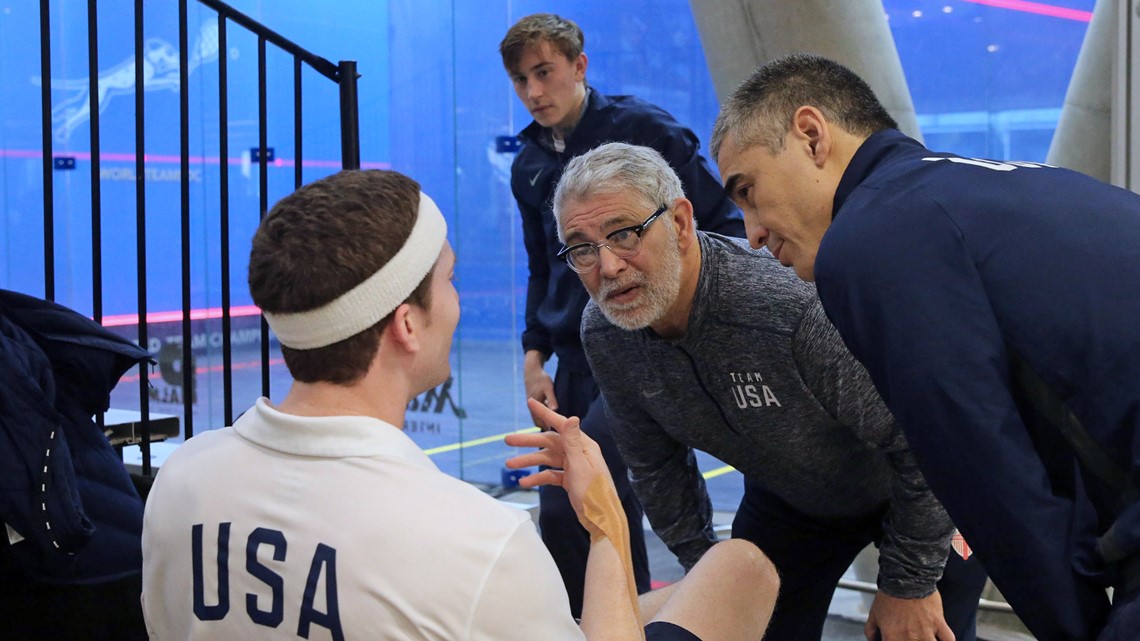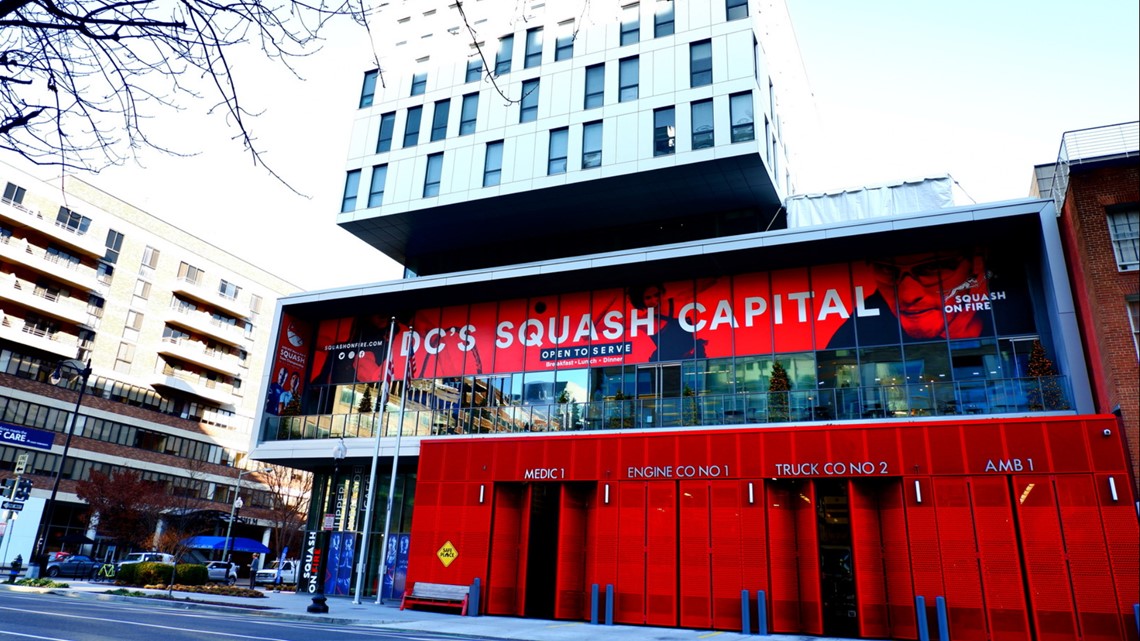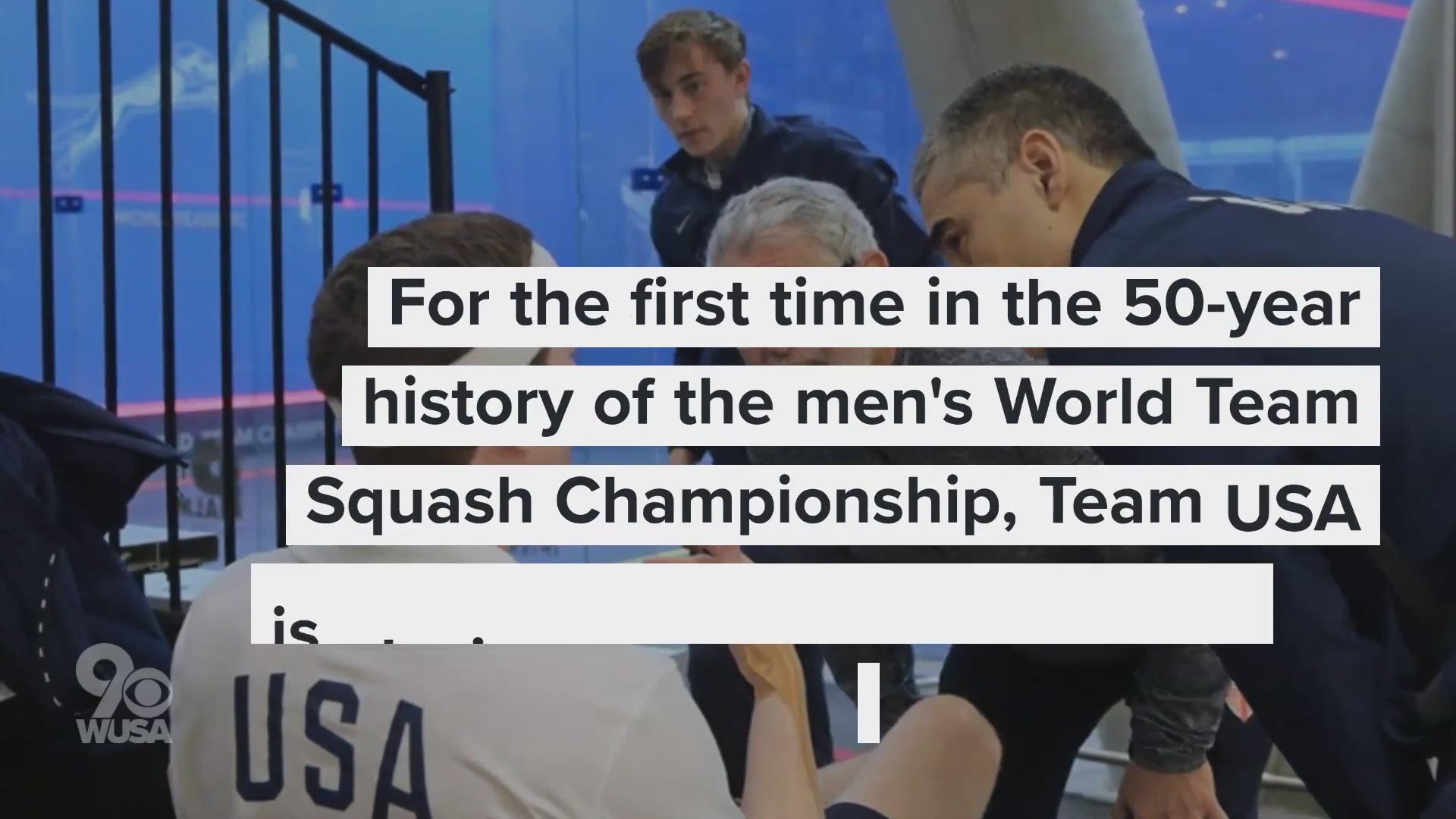WASHINGTON — Paul Assaiante had never stepped foot on a squash court until he unwittingly became the squash coach at West Point. Now, he's coaching the U.S. men's squash team in the world championship. And for the first time in the tournament's 50-year history, Team USA is playing on their home turf, in the nation's capital.
The biennial Men's World Team Squash Championship, first played in 1967, had never been played on American soil until this year's tournament kicked off at Squash on Fire on Dec. 15. Assaiante will coach the four-man U.S. team alongside Thierry Lincou, a former squash world champion from France, in the finals Saturday.
The team ranges in age from 33-year-old veteran Chris Gordon to 21-year-old University of Pennsylvania junior Andrew Douglas; 29-year-olds Chris Hanson and Todd Harrity round out the squash squad.
"Representing your country on home soil is something that you might only get to do once in your career, if you’re fortunate, so the moment really needs to be savored," Hanson said.
For the uninitiated, squash is played on an enclosed, indoor court with a hard, rubber ball, similar in size to a ping pong ball. Two players take each other on in a match to 11 points, and you must win by two points. For this particular tournament, the team is four players, but only three can play each day. The coach sets a new lineup every day.
"So on any given day, 25% of the team hates me, because they aren't playing," Assaiante jokes.


Assaiante, the head coach of men's squash at Trinity University, stumbled into the competitive world of squash 44 years ago, after applying for a job for which he said he was woefully unqualified.
"I was the gymnastics coach at West Point, but when the tennis coach quit, I applied, even though I had no business applying" Assaiante said. "I guess no one wanted the job because I got it."
When he was shown the squash courts, a place he didn't even know existed at the Academy, he was told "oh by the way, you're also the squash coach." Assaiante had only one request of his cadets that season.
"I told them 'I'll make you the most fit team in the country, if you teach me how to play squash,'" Assaiante said.
Though Assaiante doesn't have any Trinity players on Team USA, two of his players are competing against him -- for other countries.
"It is very much an international sport," Assaiante said. "We weren't that competitive with international powers when we first started, but junior squash participation in the U.S. is up 500% over the last decade."


Assaiante credits much of the growth to increased accessibility sweeping the sport, which for a long time had a reputation of being an elitist, private club or school activity. The repute is ironic, given that squash got its start in London prisons in the 18th century. He said the efforts of public facilities like Squash on Fire are behind the "explosion of popularity" for squash in the U.S.
Squash on Fire was created after co-founder Philippe Lanier, and his family, witnessed first hand the inconsistencies in the way the sport was run in the U.S., while his younger sister was playing on an international level.
"In America, squash is a sport that is built as part of a larger complex, hidden behind a paywall because of a membership-only model," Lanier said. "In Squash on Fire, we think we've created a model that removes the barriers to the sport, and really encourages people to pick up a racquet and try it."
Part of that model includes offering public courts, which can be seen from the street thanks to an all-glass facade, and incorporating a restaurant within the club, which he called a "social hub." Lanier estimates that an average of 200 new players visit Squash on Fire every month.
The tournament, despite not bringing a championship win to D.C., has drawn crowds of close to 450 fans per day.
Team USA faced the defending champions, Team Egypt -- who also happens to have the four highest-ranked players in the world --, in the first round of the tournament and were defeated 3-0.The U.S. went on to lose a 1-2 heartbreaker to the Swiss team.
"I think we were really feeling the pressure of playing at home in that one," Assaiante said.
Assaiante's team rallied in the third round against Jamaica with a resounding 2-0 win thanks to victories from Harrity and Douglas. The winning streak continued into the semi-finals with a 2-1 win over Argentina, with Gordon sweeping the third match.
While a championship still eludes Team USA, and won't happen this year as the team aims to finish in the 13th seed, the girls Junior Squash team finished second at their World Championship, the boys junior team finished third and the women's national squash team was fourth.
"We're getting there," Assaiante said. "But we have to keep our foot on the accelerator and not lose momentum."
Team USA will close out their tournament against Canada or Kuwait Saturday, Dec. 21 at 12:30pm. Watch live on SquashTV or PSA World Tour Facebook Live.

